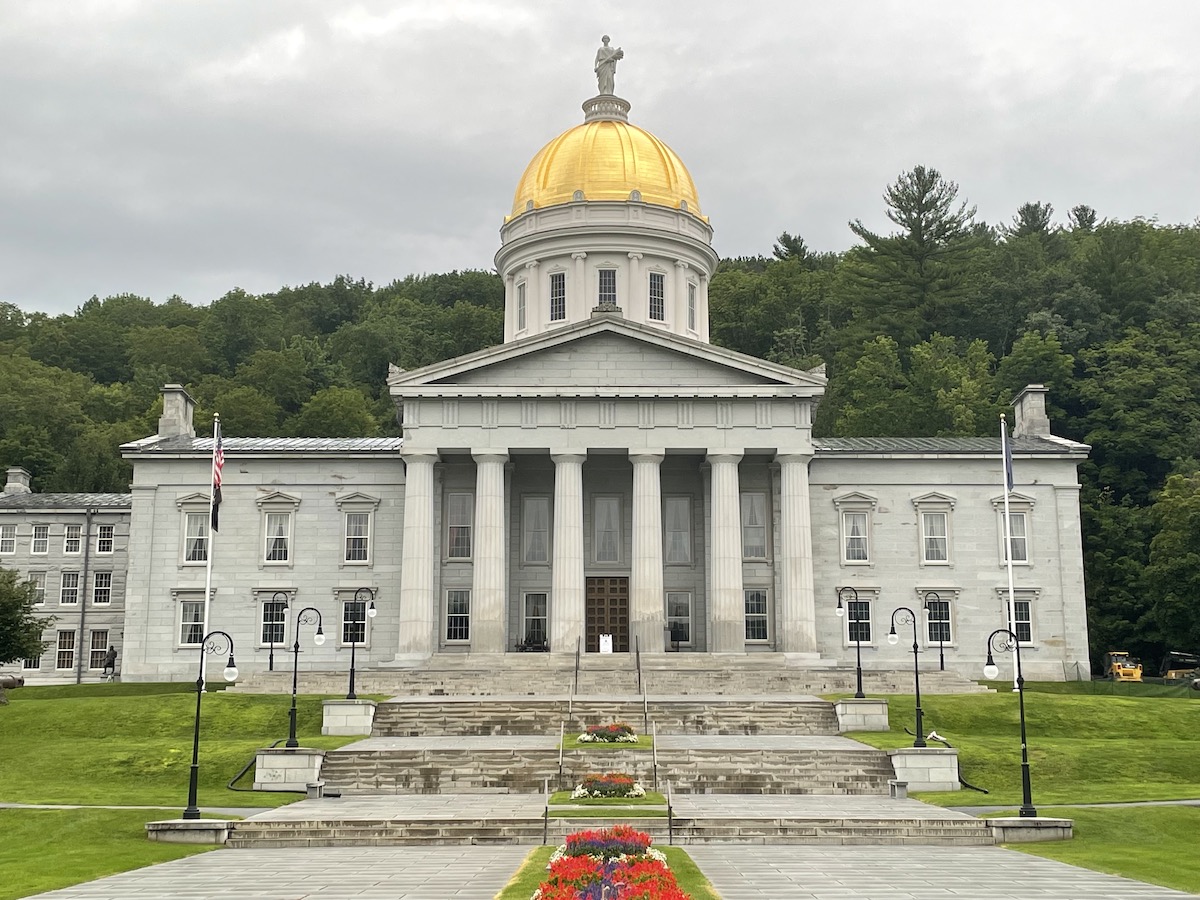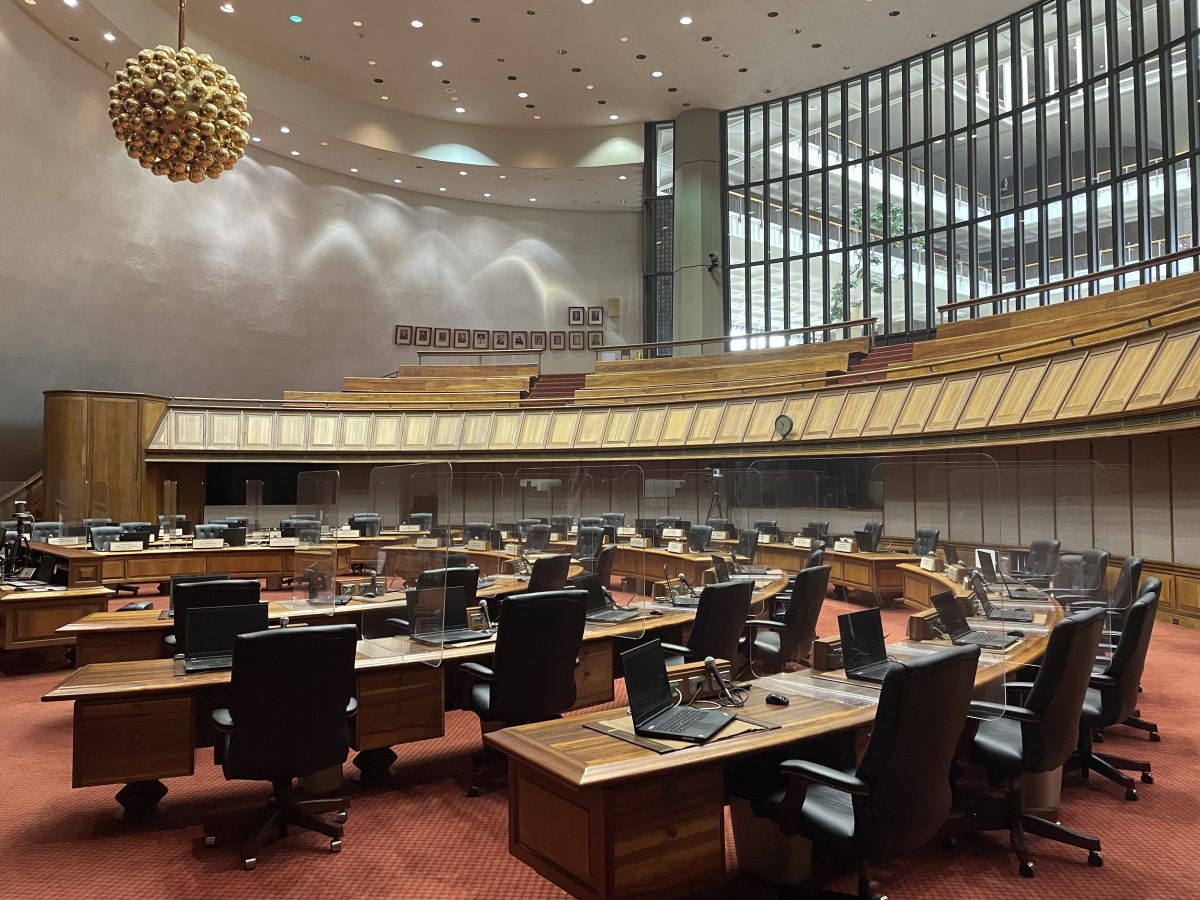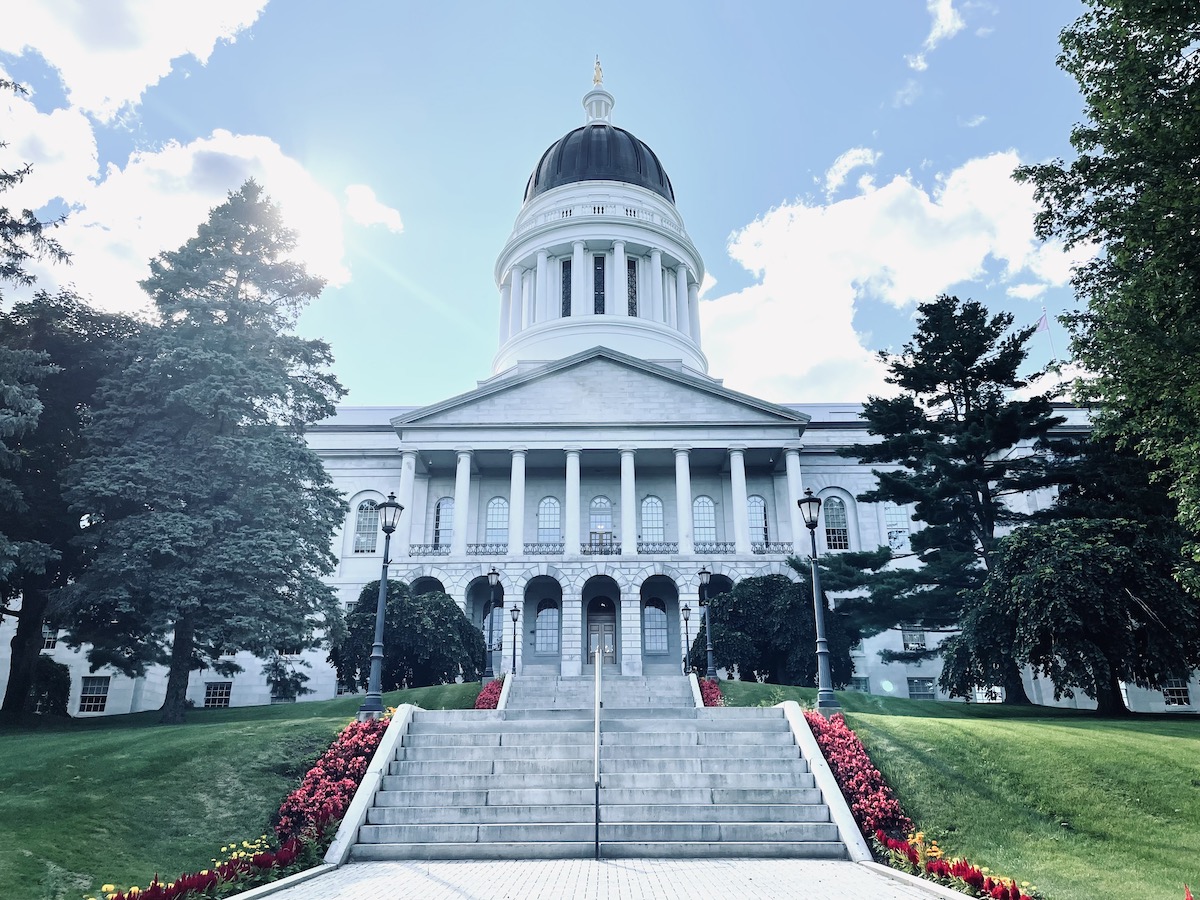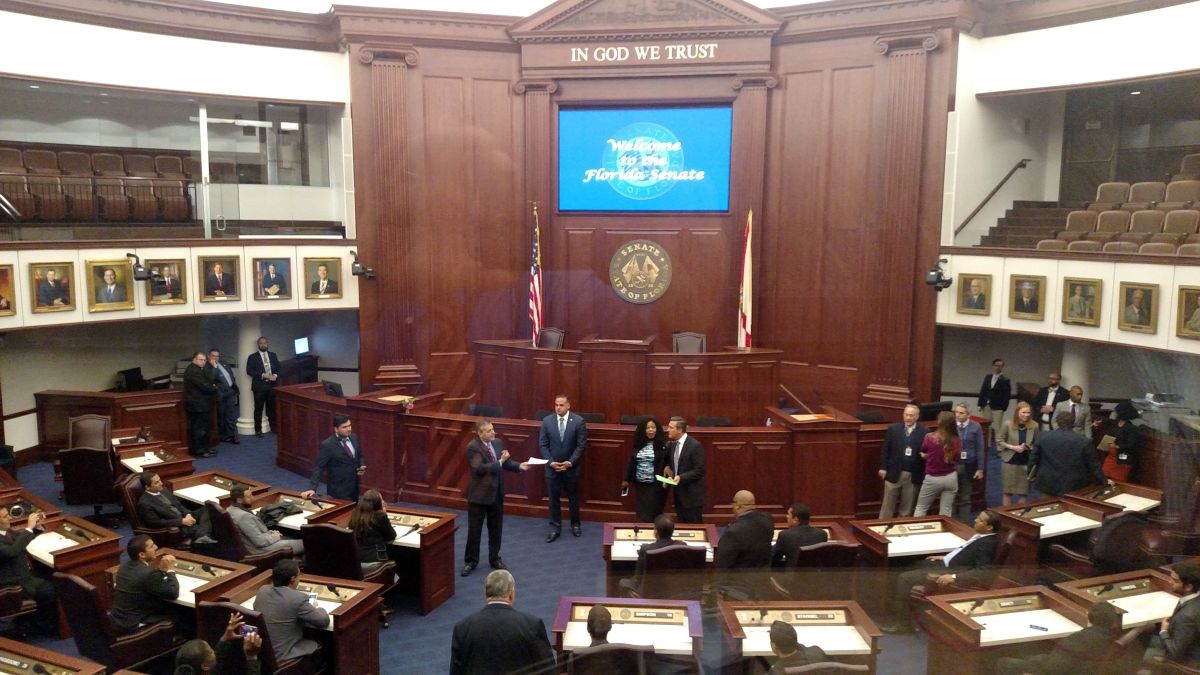Stand up for the facts!
Our only agenda is to publish the truth so you can be an informed participant in democracy.
We need your help.
I would like to contribute
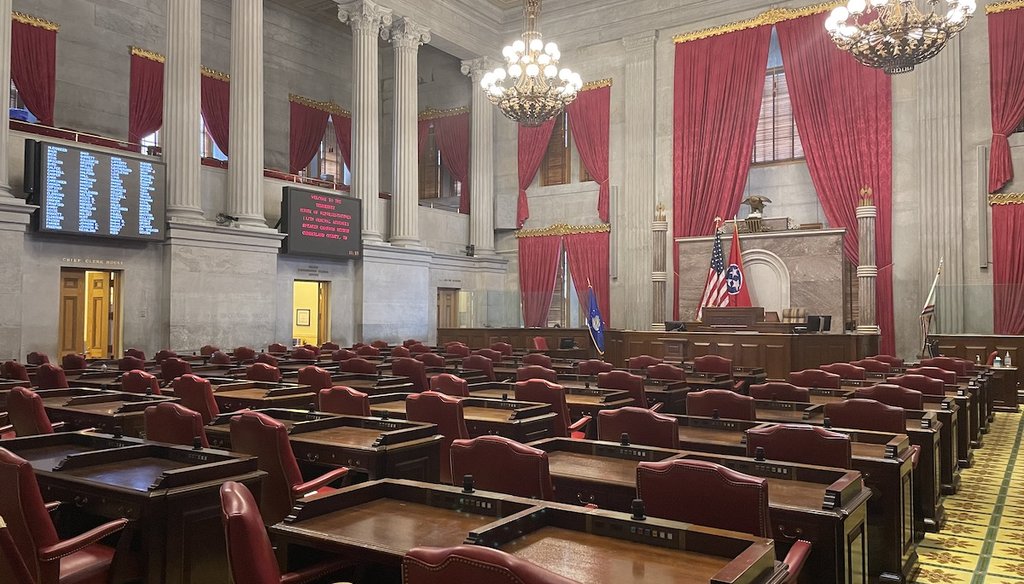
The state House chamber in Nashville, Tennessee. (Louis Jacobson/PolitiFact)
The U.S. Supreme Court is considering one of the most important election law cases in decades, with potentially sweeping consequences for how congressional districts are drawn and how future federal elections will be held.
The case stems from a dispute over redistricting in North Carolina, namely whether the state Supreme Court had the power to invalidate congressional maps drawn by the Legislature. The case centers on a once-obscure doctrine backed by some conservatives: the independent state legislature theory.
Under the doctrine’s broadest reading, state legislatures would have full power to define how elections are run, without the ability of state courts to exercise oversight.
Election law experts say the case could open the door to state legislatures subverting election results or passing election laws without the ability of state courts or governors to have a say. The case also raises questions about whether changes made to election laws through voter-approved ballot measures, such as Alaska’s adoption of ranked choice voting, would be allowed to stand.
"The case could upend our election system and usher in a new era of electoral chaos," said Helen White, counsel at Protect Democracy, a group that was formed after Donald Trump’s election. "The case poses a real danger to democracy."
Sign up for PolitiFact texts
The Supreme Court’s hearing on the case is Dec. 7. The justices are expected to rule in the case by June.
Here’s what you need to know.
What is Moore v. Harper about?
Following the 2020 census, the Republican-controlled North Carolina General Assembly crafted a redistricting plan for U.S. House seats. A voter lawsuit argued that the maps diluted Democrats’ power. The state Supreme Court ruled that the plan was a partisan gerrymander in violation of the state Constitution. The state had to use a map with more partisan balance in the 2022 midterm election.
However, Timothy Moore, the state’s House speaker, spearheaded a lawsuit that argued that state courts and state constitutions don’t have power over federal elections, citing language in the U.S. Constitution. Moore’s name headlines the lawsuit, along with that of Rebecca Harper, a voter involved in the lawsuit against the initial maps.
The plaintiffs are asking the court to embrace the independent state legislature theory and use it to reinstate the state General Assembly’s power to enact new maps.
The Vermont state capitol in Montpelier. (Louis Jacobson/PolitiFact)
What is the independent state legislature theory?
The doctrine draws from two parts of the U.S. Constitution:
-
Article I, Section 4: "The Times, Places and Manner of holding Elections for Senators and Representatives, shall be prescribed in each State by the Legislature thereof."
-
Article II, Section 1: "Each State shall appoint, in such Manner as the Legislature thereof may direct, a Number of Electors."
Traditionally, this has been interpreted to mean that state legislatures can set election rules, such as how many days of early voting are offered, deadlines for receiving mail ballots and rules about voter identification requirements. But sometimes the courts overrule what state Legislatures do, if they believe the Legislature is acting unconstitutionally.
Historically, the legislature’s laws have been "subject to normal state processes: Election administrators fix the details for administering the vote, state courts interpret the meaning of state election rules, and sometimes judges and officials decide when state rules violate state constitutional rights to vote," wrote Rick Hasen, an election law expert in an article for Slate.
Republicans, who control a majority of state legislative chambers, have chafed at how some states made rule changes for elections during the coronavirus pandemic in 2020, such as easing the process for submitting mail ballots and installing drop boxes for ballots. The plaintiffs argue that the U.S. Constitution singles out state legislatures — not governors, appointed election officials or state courts — as holding the sole power over federal elections.
Nathaniel Persily, an election law specialist at Stanford University, told The New Yorker that the doctrine gives "intellectual respectability" to an otherwise "anti-democratic argument."
The question now for the Supreme Court is whether the U.S. Constitution intended to limit the power over elections to state legislatures only.
How could a Supreme Court ruling affect state election laws?
If the justices fully backed the doctrine, state courts could no longer apply state constitutions to adjudicate partisan gerrymandering claims involving congressional districts, said Bertrall Ross, a University of Virginia law professor. That would likely lead to more extreme gerrymandering, he said.
Also, the most extreme reading of the theory could jeopardize voter-approved changes to state election laws, such as Michigan voters’ approval of no-excuse absentee voting, Alaska’s adoption of ranked choice voting and Nevada’s adoption of automatic voter registration.
Logically, barring anyone but legislatures from determining election law would also prevent governors from exercising the veto power over election law, experts say, even though they wield veto power on almost all other legislation passed by the legislature.
"That's a massive upheaval with widespread consequences for federal consequences," White said.
The House chamber in the Hawaii state capitol. (Louis Jacobson/PolitiFact)
What impact could a more modest ruling have?
Potential "middle ground" rulings could still have fairly radical effects.
One possible outcome would allow state courts to rule on partisan gerrymandering claims under the state constitution but bar those courts from drawing a new map, Ross said. The problem with that approach, he said, was that a legislature could refuse to draw a constitutionally acceptable map and the court wouldn’t have any way to enforce its ruling, he said.
This scenario might mirror one that occurred in Ohio in 2022, when a narrowly divided court found that the Republican Legislature’s maps were partisan gerrymanders, but the Legislature and state officials, all of them Republican, ran out the legal clock before the election without having to redraw the maps.
One thing that a Supreme Court ruling wouldn’t change is that several federal laws remain in place to protect voters, such as the Voting Rights Act and the National Voter Registration Act.
Who are the key lawyers on both sides?
Those promoting the independent state legislature theory are conservatives. The lead attorney representing Moore is David H. Thompson, who has handled a long list of constitutional lawsuits from a conservative perspective, including cases on guns, affirmative action, school desegregation and same-sex marriage. He has also represented the conservative side in a number of election-law cases, including those involving voter identification requirements, ex-felon voting rights, drop boxes, absentee ballots, and voting by noncitizens. He also represented the challenge to the McCain-Feingold campaign finance law at the Supreme Court.
Meanwhile, multiple conservatives have joined liberals in rejecting the independent state legislature theory. They include former former federal appellate judge Michael Luttig, who worked for President Ronald Reagan and was appointed to the federal bench by President George H.W. Bush, who serves as co-counsel to Neal Katyal, a former acting U.S. solicitor general under President Barack Obama. The day before Jan. 6, 2021, Luttig tweeted his argument for why Vice President Mike Pence had no power to honor Trump’s request to reject some state’s electoral votes for Biden.
The Maine state capitol in Augusta. (Louis Jacobson/PolitiFact)
Could a Supreme Court ruling in favor of the theory allow legislatures to choose their own electors?
A high court ruling could have implications for how states handle presidential election results.
Following the 2020 election, presidential electors followed official procedure by signing certificates, including in key battlegrounds such as Georgia and Wisconsin, affirming that Joe Biden won their state. But some Republicans signed their own certificates that declared Trump the winner in those states. Such efforts have been derided as trying to pass off "fake electors," and they have put participants in legal risk.
Could state legislatures that share a party with the losing candidate simply issue their own certificates for the losing candidates? Experts have generally said that even the most extreme reading of the doctrine would not allow this — at least after Election Day.
Nothing in the Constitution or federal law allows a state legislature to say, "We are going to have a general election and after that, say we changed our mind — we don’t like the way it came out, and so appoint our own electors," said Carolyn Shapiro, a constitutional law professor at Chicago-Kent College of Law.
However, a ruling that favors Moore’s argument could enable state legislatures to set laws before Election Day that could subvert the popular vote. University of Illinois law school dean Vikram Amar said a state legislature could decide before Election Day that if there is a dispute about who got more votes, "We, rather than the state courts, decide who got more votes.’"
Do the justices' records provide any hints as to how the court will respond in this case?
Some scholars have said the independent state legislature doctrine has its roots in the 19th or early 20th century, though it has largely drawn attention the past couple of decades.
Early academic scholarship about "independent legislature" appears in Amar’s March 2000 William & Mary Law review article, "The People Made Me Do It: Can the People of the States Instruct and Coerce Their State Legislatures in the Article V Constitutional Amendment Process?" In 2001, Florida State University law review published an article about the independent state legislature doctrine.
The doctrine has come up only a few times in recent decades, but the justices’ past rulings have sent contradictory messages, experts said.
After the 2000 election, Chief Justice William Rehnquist proposed a version of the theory in Bush v. Gore arguing that the Florida court’s recount conflicted with the deadlines set by the state Legislature for the election, wrote Amy Howe, a reporter for SCOTUSblog, which tracks Supreme Court decisions.
Rehnquist wrote that the clause about presidential electors delegates authority to the Legislature, "thus the text of the election law itself, and not just its interpretation by the courts of the States, takes on independent significance." Clarence Thomas was the only current justice to join this opinion.
The theory came up again in a 2015 Arizona redistricting case. The Supreme Court rejected the theory, ruling 5-4 that it was permissible for a popular ballot initiative to create an independent redistricting commission. Three current justices dissented: John Roberts, Samuel Alito and Thomas. (The fourth was Antonin Scalia, who died in 2016.)
Meanwhile, in a previous North Carolina congressional redistricting case, Rucho v. Common Cause, all the justices in 2019 agreed state constitutions, and by extension, state courts, could be used to prohibit partisan gerrymandering. The majority opinion, written by Roberts, specifically cited two other institutions that were positioned to adjudicate partisan gerrymandering claims: Congress, and state courts.
During the 2020 election cycle, Justices Alito, Thomas, Gorsuch and, at times, Kavanaugh all expressed some degree of support for the theory, White said.
The Senate chamber in the Florida state capitol in Tallahassee. (Louis Jacobson/PolitiFact)
What could this mean for the future powers of courts to rule in election cases?
The most aggressive ruling in Moore’s favor would diminish the power of the state courts, potentially sending more litigation to the federal courts, including the Supreme Court.
The Conference of Chief Justices of the highest courts in all the states filed a brief stating it takes no position on how the Supreme Court should handle the case. But it asked the Supreme Court to rule that the Elections Clause does not "oust state courts from their traditional role in reviewing election laws under state constitutions."
Technically, Moore v. Harper is about federal elections, not state or local elections. That’s part of why critics say the theory could create chaos, because federal, state and local candidates often appear on the same ballot.
Al Schmidt, a former Republican city commissioner in Philadelphia who served on his city’s board of elections in 2020, said the case could add uncertainty to election administration.
"From a practical perspective, it invites both chaos and paralysis into the system in a way that election administration becomes unworkable to have different rules for different candidates in the conduct of elections on the same ballot," Schmidt said during a recent webinar hosted by New York University’s Brennan Center for Justice.
RELATED: All of our fact-checks about the U.S. Supreme Court
Our Sources
U.S. Supreme Court, Documents in Moore v Harper, 2022
Columbia Law School, Five Questions on the Independent State Legislature Theory for Elections Expert Richard Briffault, 2022
Brennan Center for Justice at New York University School of Law, The ‘Independent State Legislature Theory,’ Explained, June 6, 2022
Brennan Center for Justice at New York University School of Law, A Guide to Recent Scholarship on the ‘Independent State Legislature Theory’
Slate, The Supreme Court Case that Could Upend Democracy, Nov. 30, 2022
UCLA, Moore v Harper, the Independent State Legislature Theory and Potential Threats to American Democracy webinar Aug. 25, 2022
Vikram D. Amar and Akhil Amar, Supreme Court Review, "Eradicating Bush-League Arguments Root and Branch: The Article II Independent-State-Legislature Notion and Related Rubbish" July 2022
Brennan Center for Justice at NYU School of Law, Webinar, Dec. 1, 2022
University of Iowa law school, A Q&A with Professor Derek Muller: Breaking down Moore v. Harper and the amicus brief he filed in the case, Nov. 28, 2022
Fred Wertheimer, Democracy 21, Democracy on the ballot—the "independent state legislature theory" will not empower state legislatures to override presidential election results, Nov. 4, 2022
Newsy, What is the independent state legislature theory? Sept. 13, 2022
The New York Times, Supreme Court Case on State Legislatures Could Open Litigation Floodgates, Nov. 7, 2022
JustSecurity, The independent state legislature theory should horrify Supreme Court’s originalists, June 30, 2022
Washington Post op-ed by Sam Wang, Opinion Republicans’ Supreme Court argument on redistricting could backfire, Dec. 1, 2022
News and Observer, ’The single-most important case on American democracy.’ Could it overturn elections? Nov. 28, 2022
Richard Rifkin, "Moore v. Harper: May state laws concerning federal elections be subject to state judicial review?" Nov. 7, 2022
Florida State University law professor Michael Morley in the Fordham Law Review, The Independent State Legislature Doctrine, 2021
Vikram David Amar in William and Mary Law Review, The people made me do it: Can the people of the states instruct and coerce their state legislatures in the Article V Constitutional amendment process? 2000
SCOTUSBlog, Justices will hear case that tests power of state legislatures to set rules for federal elections, June 30, 2022
PolitiFact, Steve Scalise’s flawed argument that states didn’t follow their own election laws Oct. 15, 2021
Telephone interview, Carolyn Shapiro, founder and co-director of Chicago-Kent's Institute on the Supreme Court of the United States, Dec. 2, 2022
Email interview with Helen White, counsel at Protect Democracy, Dec. 2, 2022
Email interview with Vikram Amar, Illinois College of Law dean, Dec. 2, 2022
Email interview with Bertrall Ross, law professor and director of the Karsh Center for Law and Democracy at the University of Virginia, Dec. 1, 2022


